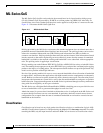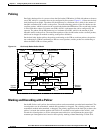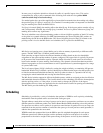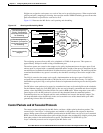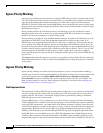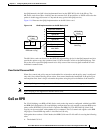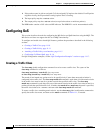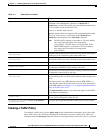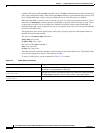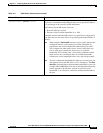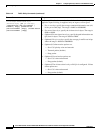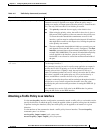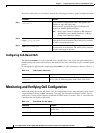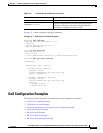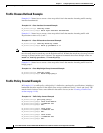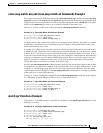
11-12
Cisco ONS 15310-CL and Cisco ONS 15310-MA Ethernet Card Software Feature and Configuration Guide R8.5
78-18133-01
Chapter 11 Configuring Quality of Service on the ML-Series Card
Configuring QoS
with the traffic policy when the class command is used. The class command must be issued after entering
policy-map configuration mode. After entering the class command, you are automatically in policy-map
class configuration mode, which is where the QoS policies for the traffic policy are defined.
When the bandwidth or priority action is used on any class in a policy map, then there must be a class,
defined by the match-any command, that has a bandwidth or priority action in that policy map. This is
to ensure that all traffic can be classified into a default class that has some assigned bandwidth. A
minimum bandwidth can be assigned if the class is not expected to be used or if no reserved bandwidth
is desired for default traffic.
The QoS policies that can be applied in the traffic policy in policy-map class configuration mode are
detailed in the following example.
The syntax of the policy-map command is:
policy-map policy-name
no policy-map policy-name
The syntax of the class command is:
class class-map-name
no class class-map-name
All traffic that fails to meet the matching criteria belongs to the default traffic class. The default traffic
class can be configured by the user, but cannot be deleted.
To create a traffic policy, use the commands in Table 11-2 as needed.
Table 11-2 Traffic Policy Commands
Command Purpose
ML_Series (config)# policy-map
policy-name
Specifies the name of the traffic policy to configure. Names can be a
maximum of 40 alphanumeric characters.
ML_Series (config-pmap)# class
class-map-name
Specifies the name of a predefined traffic class, which was configured with
the class-map command, used to classify traffic to the traffic policy.
ML_Series (config-pmap)# class
class-default
Specifies the default class to be created as part of the traffic policy.



